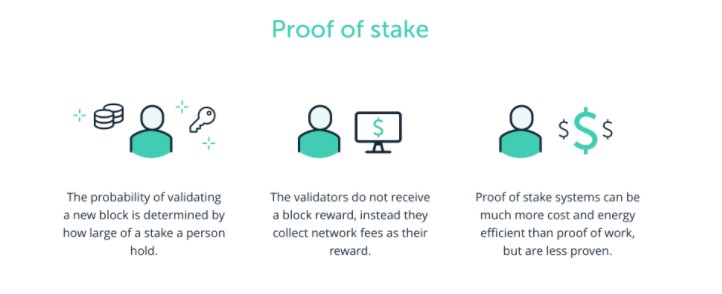Whether Proof of Stake (POS) is a better concept relative to Proof of Work (POW) has been debated in the crypto world for several years. Proof-of-stake is perceived as a method of maintaining the integrity of a cryptocurrency, preventing users from printing extra coins they didn’t earn. POS intends to mitigate the regressive distribution of POW mining rewards and move directionally towards proportional distribution.
There are multiple reasons why the crypto industry stakeholders see Proof of Stake as superior; however, is Proof of Stake secure?
Let’s take a look at some aspects that make Proof of Stake a fascinating concept.
The Fundamentals of Proof of Stake (POS)
First, what exactly is Proof of Stake (POS)? A consensus algorithm for networks on the blockchain uses random network validators, also called stakers, for the approval and verification of blocks.
POS does not need the solving of complex equations by miners, but the staking of coins. The more coins staked, the more received as a reward. To stake, a coin deposit is made in a unique wallet, which is later frozen. A minimum amount of coins is required to stake. Next, the chances of winning the staking reward are based on the number of coins staked in total. The more coins staked, the higher the chances of acquiring the block reward.
A simple example of Proof of Stake’s concept could be described using a blockchain that has 10,000 coins in circulation. If you purchase and stake 500 of these coins, you would have a 5 percent chance of winning every block reward.
The process is a bit more complicated. However, the basic principle persists – the more the coins used to stake, the higher the chances of acquiring the next block reward.
Who created Proof of Stake (POS)?
A developer who hides under Sunny King, is credited with developing the Proof of Stake consensus mechanism. He aimed to reduce the extreme energy consumption of Bitcoin mining while still having a secure and fast blockchain.
Peercoin, launched in 2012, first used the POS, and since then, many more used the same. Despite the progressive work on the POS consensus mechanism the problem remains. However, to this day, there are still several issues with the Proof of Stake distributed consensus mechanism.
Proof of Stake vs. Proof of Work – The difference
Proof of Stake (POS) and Proof of Work (POW) are currently the most popular consensus mechanisms. There are several contrasts between the two. However, the main idea is to validate records and keep them for the blockchain while producing the next block. Hence, the name blockchain.

The main difference is the reduced amount of computational work on POS consensus algorithms compared to POW. Mining does not occur, which has used a lot of electricity over the past years to verify the next blocks of Bitcoin. Therefore, POS is a much cheaper avenue to maintain a blockchain network, allowing users to command significantly lower transaction fees. The participants who stake coins get rewarded commensurate to the number of coins they have locked in with no need for massive electricity bills and complicated hardware or server farms.
Meanwhile, Proof of Work (POW) requires plenty computing power to crack tricky puzzles, validating the blockchain’s transactions and blocks. Power consumption has caused much debate about massive crypto mining farms worldwide and the pollution they have caused. In some cases, massive crypto mines have caused disruptions in the electricity grid.
Security of POW vs POS coins
As created by Satoshi Nakamoto, Proof of Work has been considered the safest form of getting new blocks added to the blockchain. However, Proof of Work has caused massive problems like electricity costs and massive hardware use to sustain mining power. Therefore, POS was developed as an alternative.
Several issues exist for the POS-based cryptocurrencies. One of the most commonly talked about is the 51 percent attack. The concept behind it is that you acquire or borrow a majority stake of a certain coin to stake them while creating false transactions. However, this is incredibly expensive, and any successful attempt would need a lot of capital. As soon as the network gets hacked, the whole system would devaluate any gains. Additionally, POS systems can penalize validators that attempt to attack the network. Therefore, they risk losing all their staked coins.
The real danger of POS is hacking the control over coins staking delegation. You could still hold the cryptocurrency while the staking power is used to create attacks on the network. This would cause network centralization, which defeats the whole point of decentralized blockchains.
In reality, attacks like these are practically impossible to execute on already well-established blockchains. The attacker himself could be left with millions or even billions worth of coins that nobody will accept.
Which crypto uses Proof of Stake?
Tezos (XTZ)
Tezos is known for having one of the biggest ICOs of all time, with nearly $232 million worth of XTZ tokens distributed. It is a multi-purpose blockchain that uses a Proof-of-Stake (POS) protocol to secure its network.
Tezos uses a custom POS protocol called “Liquid Proof-of-Stake” (LPoS), which does not require the XTZ tokens to be locked in as they can be delegated to a validator. You can keep your coins in your wallet and continue earning rewards.
Cosmos (ATOM)
Launched in April of 2017, Cosmos uses their own native cryptocurrency called Atom to transact. It aims to fix the scalability and interoperability problems that the blockchain industry has faced for the past years.
It uses a hybrid proof of stake system where validators are delegated and rewarded for maintaining the blockchain’s security. However, your Atoms do need to be locked in.
Algorand (ALGO)
Launched in June 2019, Algorand is another blockchain that uses a POS mechanism to secure the network. The three main challenges it aims to solve are security, scalability, and decentralization.
The specific type of POS mechanism used is called pure proof of stake (PPoS), built on the Byzantine consensus principles. The basic principle is that the network is safe when most of the money is in honest validators.
To this day, it is one of the best-built blockchains at it offers good transaction throughput and finalization time.
Ethereum – Soon to be the top Proof of Stake coin
Ethereum, created by Vitalik Buterin, has been the second-largest cryptocurrency by market cap for several years. Although initially it was secured using a proof of work mechanism, the Ethereum 2.0 is expected to move it into a POS system.
As the POW shift to POS is slowly being managed, the developers have introduced something called shard chains. Ethereum 2.0 validators only need to have the data for the specific shard they’re validating with shards. This is done by splitting the blockchain horizontally to reduce the network load and give Ethereum blockchain more capacity to store and access data.
Ethereum 2.0 will require a relatively large stake of 32 ETH to become a full validator. However, staking pools are available for anyone to join with only a fraction of the amount. Additionally, Ethereum developers expect that sharding will eventually allow you to run the blockchain on simple laptops and mobile devices.
Will Proof of Stake become the new standard?
Proof of Stake has several benefits over Proof of Work.
Some of the benefits are:
- Better energy efficiency
- Lower barriers to entry
- Reduced hardware requirements
- Protection against centralization from miners
- More transactions in a certain period
With the launch of Ethereum 2.0, POS will likely become the new standard for blockchain networks as it has been the second-largest cryptocurrency for several years. Therefore, the Ethereum transition would likely cause POS to become the new standard.
POS safety issues
Network centralization is widely recognized as one of the biggest problems with POS networks, but it actually exists on a spectrum. The risk of centralization increases with on-chain, token-weighed governance. Token holders can influence the protocol to their benefit so the risk adjusted nature of those returns actually changes drastically. On the other hand, for chains without on-chain governance, there really is no additional value to owning a large portion of the network’s tokens.
One other problem of the PoS system is the “nothing at stake”. When there are no opportunity costs for forging in a particular blockchain, users could create new blocks and mine on competing branches of a blockchain to maximize the amount of transaction fees they receive. In order to address this issue, most POS coins have additional protection mechanisms built into their protocol.
Some regard the bonded PoS (BPoS) approach by Ethereum 2.0 (Serenity), RChain and Casper Labs as the only genuine PoS. The reason for this claim is that in the other cases, staking, if it even actually takes place, plays a subordinate role in the consensus. The number of coins in the BPoS case committed by the validators tend to “determine their probability of approving a given block and, thus, their stream of revenues”.
There are still debates about whether Proof of Stake is secure; however, any attempt to hack an established blockchain network would be incredibly costly.
Key takeaways
Staking is becoming increasingly popular as Ethereum is transitioning into a POS consensus mechanism. It allows a low barrier to entry for those who want to secure and run a blockchain network.
Sharding refers to splitting the network into several parallel pieces, which allows for an increased capacity and speed.
POS should allow better sustainability as it does not require the huge amount of resources that the POW mechanism does. No more need for massive mining farms that consume half of the cities power consumption.
Do you want to have a passive income? Deposit a certain amount in a special staking wallet to get qualified as a node. It depends, of course, but later, the system might want you to become a validator/miner because you’ve got more funds than the other candidates.
Once you’re a validator, you unlock quite a few new options to earn crypto. When your node forges a new block, you get a reward. When you approve transactions, you get small fees. Besides, if you simply stake money in the wallet on a monthly or yearly basis, you earn interest, as it’s good for the network and it’s good for the user.
Proof of Stake has widespread support among many industry experts, and should allow better sustainability.
If you want to read more on how the POS security model actually works, check out this amazing resource from Vitalik and the Ethereum team.





